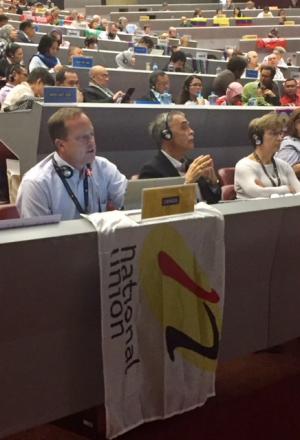This is an archive of news stories and research from the National Union of Public and General Employees. Please see our new site - https://nupge.ca - for the most current information.
Mike Parker, NUPGE NEB member and HSAA President, addressed the PSI World Congress detailing how the labour movement can push legislators to ensure presumptive coverage for mental injuries is available to all workers.

HSAA President
Geneva, Switzerland (01 Nov. 2017) — The motion to support workers with mental injuries hit the floor of the Public Services International (PSI) World Congress this morning.
NUPGE motion speaks to life-long battles with PTSD and the need for support
Mike Parker, representing the National Union of Public and General Employees (NUPGE), who moved the motion, spoke about the importance of providing a frontline perspective to the growing issue of mental health in the workplace.
Prior to becoming the President of the Health Sciences Association of Alberta (HSAA/NUPGE), a Component of NUPGE, Parker worked in Emergency Medical Services. He has witnessed firsthand, and knows from working with HSAA/NUPGE members, how trauma affects the lives of workers.
The resolution stresses how far reaching and enduring trauma in the workplace can be, especially for emergency first responders, health care workers, correctional workers and other classifications of workers who experience traumatic events on a regular basis. While it sometimes can be difficult to connect mental health symptoms to specific events in the workplace, we are seeing a rise in post-traumatic stress disorders (PTSD) and other mental injuries. Such serious mental injuries can have long-term effects, such as addiction to drugs or alcohol, chronic pain, hypertension or physical maladies, self-injury, overwhelming fear of death, complusiveness, personality changes and self-destructive incidents. Yet, when recognized and diagnosed, with proper supports in place, PTSD can be treated.
NUPGE's motion asks the PSI to work with affiliates to lobby governments to recognize PTSD as a workplace injury and lobby lawmakers at all levels to provide coverage to all those affected, without the need to prove causal link between PTSD and a workplace event.
NUPGE has been working on the issue of PTSD recognition as a workplace injury for several years. Alberta was the first province in Canada to provide presumptive coverage for first responders. The Manitoba government passed legislation opening up presumptive coverage to any worker with a post-traumatic injury. Saskatchewan has made changes to legislation to ensure workers are not denied coverage and support. B.C. has legislation in the works but has not amended the Workers Compensation Act to-date. Ontario has passed legislation for first responders and is looking at expanding coverage. Nova Scotia is considering the issue.
